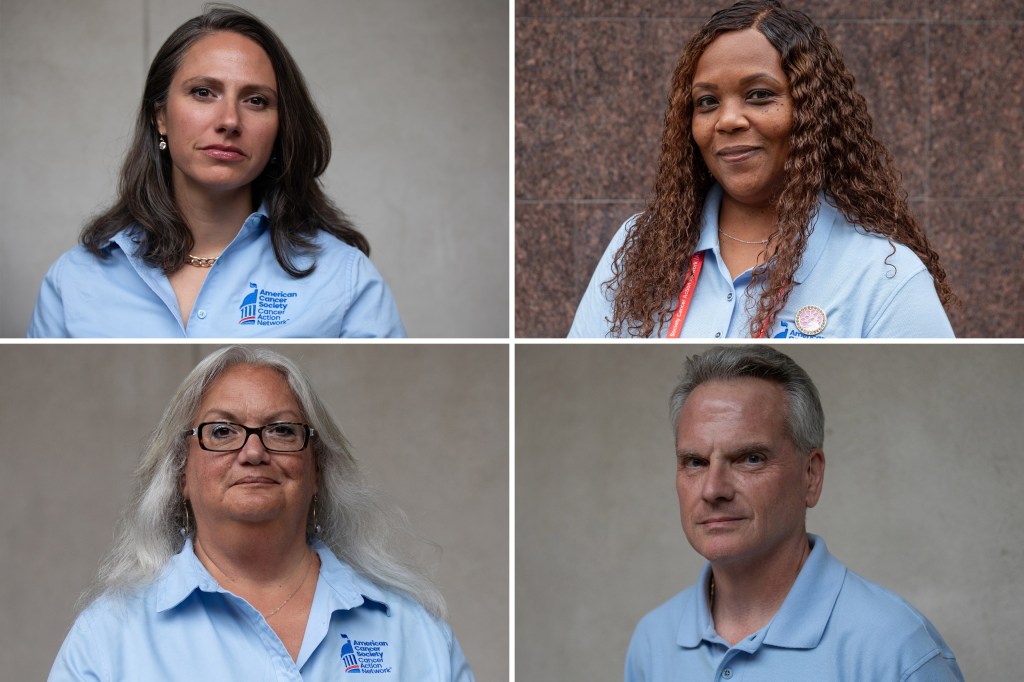Health
Citizen Lobbyists Unite to Advocate for Cancer Research Funding

More than 500 citizen lobbyists gathered in Washington D.C. last month, advocating for increased funding for cancer research and support for patients. Among them were Mary Catherine Johnson, a retired small-business owner from Rochester, New York, and Lexy Mealing, a former medical office worker from Long Island. Despite their differing political affiliations—Johnson voted for Donald Trump three times while Mealing identifies as a Democrat—these women share a profound bond: both are breast cancer survivors.
This annual lobbying event, organized by the American Cancer Society Cancer Action Network, aims to push Congress to prioritize cancer care amid a politically charged climate. This year’s gathering occurred during a period when partisan tensions threatened to lead to a federal government shutdown. Yet, the focus for these volunteers remained clear: to unite for a cause that transcends political differences.
“Not one person here discussed if you’re a Democrat, if you’re a Republican,” Mealing stated, representing a group of 27 volunteers from New York. “Cancer doesn’t care.”
Each participant had been affected by cancer, a disease projected to claim over 600,000 lives in the United States this year alone. Johnson shared her own family’s tragic history, noting that all ten of her mother’s siblings succumbed to cancer. She expressed concern about the current political climate, saying, “I think we’re probably the most divided that we’ve ever been. That scares me. Scares me for my grandchildren.”
The anxiety over political divisions was palpable among the volunteers. Katie Martin, a participant from outside Buffalo, described a troubling scene where political protesters shouted at each other. “It’s very heartbreaking,” she remarked, reflecting on her daughter’s confusion about the discord.
Despite the political landscape, support for cancer research and healthcare remains a unifying issue across party lines. Recent polling indicates that 70% of voters believe federal funding for medical research is critical, with majorities from both major parties in agreement. “Almost everybody in this country knows somebody who’s had cancer,” said Republican pollster Jarrett Lewis, who conducted research on behalf of patient advocacy groups.
In addition, a recent KFF poll revealed that three-quarters of U.S. adults, including a significant number of Republicans aligned with the Make America Great Again movement, support extending subsidies for health insurance through the Affordable Care Act marketplaces. These subsidies are vital for those with chronic illnesses, including cancer patients, yet they have become a contentious point in ongoing budget discussions in Congress.
During the lobby day, participants focused on advocating for key issues: increasing funding for cancer research, maintaining insurance subsidies, and expanding access to cancer screenings. Martin emphasized the importance of their collective mission, saying, “We may not see eye to eye politically. We might not even see eye to eye in social circumstances. But we can see beyond those differences because we’re here for one cause.”
The delegates practiced their pitches to members of Congress, sharing personal stories and strategizing how to effectively engage with lawmakers. On the morning of the lobby day, they donned matching blue polo shirts and gathered in a ballroom equipped with red information folders to distribute during their visits.
They received motivational support from college basketball coaches before heading to Capitol Hill, where they visited 484 out of 535 Senate and House offices. Not every meeting yielded positive results, particularly regarding insurance subsidies, which some Republican lawmakers oppose due to concerns about cost. Nonetheless, there is bipartisan support for increased cancer research funding and enhanced screening services.
As the day concluded, Mealing reflected on the sense of community among the volunteers, stating, “It was amazing. You could just feel the sense of, ‘Everybody stronger together.’”
The event culminated in a candlelight vigil on the National Mall, despite the rain. Around a pond near the Lincoln Memorial, approximately 10,000 tea lights illuminated the night, each bearing the name of someone who had been impacted by cancer.
John Manna, a volunteer from New York who identifies as a Reagan Republican, shared insights from the day, emphasizing the need for dialogue in a divided nation. “Talk to people,” he advised. “Get to know each other as people, and then you can understand somebody’s positions.” Manna expressed his intention to return next year, underscoring the importance of continuing the fight for cancer advocacy.
The annual gathering not only serves as a platform for pressing legislative issues but also fosters connections among individuals from diverse backgrounds, all united by a shared experience with cancer.
-

 Science4 weeks ago
Science4 weeks agoALMA Discovers Companion Orbiting Giant Red Star π 1 Gruis
-

 Top Stories2 months ago
Top Stories2 months agoNew ‘Star Trek: Voyager’ Game Demo Released, Players Test Limits
-

 Politics2 months ago
Politics2 months agoSEVENTEEN’s Mingyu Faces Backlash Over Alcohol Incident at Concert
-

 World2 months ago
World2 months agoGlobal Air Forces Ranked by Annual Defense Budgets in 2025
-

 World2 months ago
World2 months agoMass Production of F-35 Fighter Jet Drives Down Costs
-

 World2 months ago
World2 months agoElectrification Challenges Demand Advanced Multiphysics Modeling
-

 Business2 months ago
Business2 months agoGold Investment Surge: Top Mutual Funds and ETF Alternatives
-

 Science2 months ago
Science2 months agoTime Crystals Revolutionize Quantum Computing Potential
-

 Top Stories2 months ago
Top Stories2 months agoDirecTV to Launch AI-Driven Ads with User Likenesses in 2026
-

 Entertainment2 months ago
Entertainment2 months agoFreeport Art Gallery Transforms Waste into Creative Masterpieces
-

 Business2 months ago
Business2 months agoUS Government Denies Coal Lease Bid, Impacting Industry Revival Efforts
-

 Health2 months ago
Health2 months agoGavin Newsom Critiques Trump’s Health and National Guard Plans









